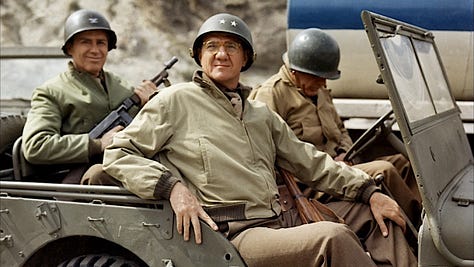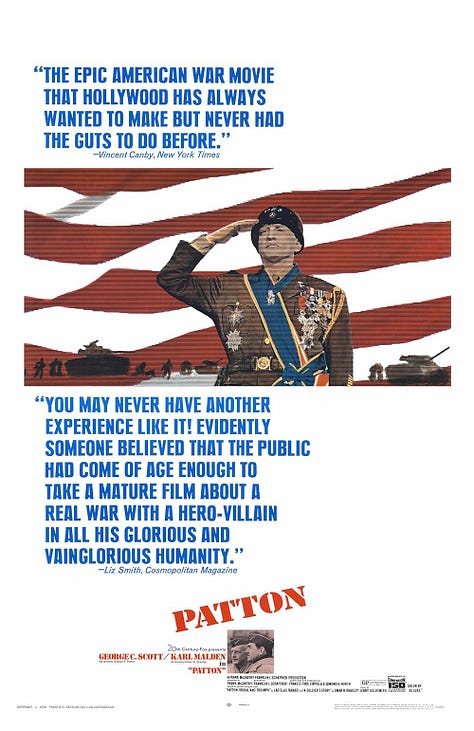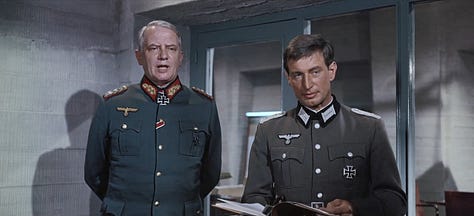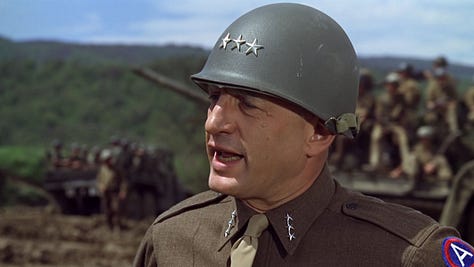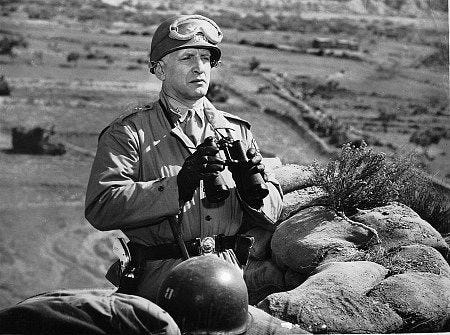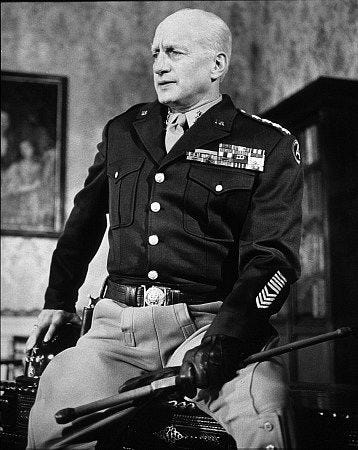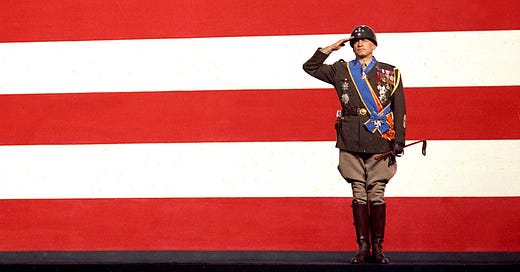PATTON
1970 • Franklin J. SchaffnerCast: George C. Scott, Karl Malden, David Bauer, Edward Binns, John Doucette, Michael Strong, Peter Barkworth, Lawrence Dobkin, Paul Stevens, Morgan Paull
Screenplay: Francis Ford Coppola, Edmund H. North; Based on Patton: Ordeal and Triumph by Ladislas Farago; A Soldier's Story by Omar N. Bradley
Cinematography: Fred J. Koenekamp
Music: Jerry Goldsmith
20th Century Fox
Now I want you to remember that no bastard ever won a war by dying for his country. He won it by making the other poor dumb bastard die for his country.
Starring George C. Scott in the titular role, Patton focuses on the controversial and colorful career of General Patton during World War II. Through key battles like the North African campaign and the invasion of Sicily, Patton's patriotic fervor and competitive spirit shine. The film explores his relationships with fellow commanders and his clashes with superiors. Despite setbacks and controversies, Patton's leadership prevails, notably during the Battle of the Bulge.
With unwavering intensity, George C. Scott embodies Patton's larger-than-life persona, infusing the character with unparalleled charisma. His portrayal delves deep into the complexities of Patton's personality, depicting the general's contradictions and inner struggles. Scott's performance isn’t mimicry. Instead, he brings Patton to life with a raw, visceral energy that commands attention. From Patton's fiery speeches to his moments of introspection, Scott masterfully captures the essence of a man driven by unwavering conviction and unyielding ambition. Scott's performance garnered widespread acclaim from audiences and critics alike, cementing his reputation as one of the greatest actors of his generation, earning him an Academy Award for Best Actor, which he famously refused.
Patton is renowned for its breathtaking depiction of the epic battles that defined General George S. Patton's campaigns across North Africa and Europe during World War II. Franklin J. Schaffner's direction brings these historic battles to life with unparalleled realism and intensity. The film immerses viewers in the chaos and brutality of warfare. Through stunning cinematography, thrilling action choreography, and effective editing, you are transported to the sun-scorched deserts and rugged landscapes where Patton and his troops fought against formidable adversaries. Each battle scene is a tour de force, capturing the scale and ferocity of combat. Through sweeping aerial shots and gritty ground-level perspectives, audiences witness the ebb and flow of battle as Patton and his troops press forward with unwavering determination.
The opening scene is one of the most iconic and memorable moments in the film. The camera focuses on Patton's figure, flush against the American flag, as he addresses his soldiers, his voice booming with authority and conviction. The speech itself is a call to arms, filled with impassioned rhetoric and colorful, and sometimes profane, language. Patton exhorts his men to embrace the challenges ahead and to fight with courage and determination. He emphasizes the importance of victory and the glory that comes with being a soldier in the United States Army. It is one of the most iconic scenes ever filmed.
The film does not shy away from depicting Patton as a flawed man. Perhaps this is best exemplified in a scene where Patton visits a medical tent tending to wounded soldiers. He is touched and honored by the sacrifice of some of the wounded, but when he comes across a man who is clearly suffering from “shell shock” (or PTSD), he melts down. He slaps the soldier and accuses him of cowardice before sending him back to the front lines. He screams "I won't have cowards in my army!" This scene highlights his disdain for “weakness” and his uncompromising standards for those under his command. This intolerance for perceived weakness is harsh and cruel, particularly in an environment as fraught with peril as the battlefield. Patton's insistence on perfection and his tendency to berate and belittle those who fall short of his expectations reveal the darker side of his character.
Patton's character in the film embodies a fascinating blend of contradictions and complexities. He is profane and vulgar, but he also speaks French fluently, reads and writes poetry, and is a student of history. While he exudes a deep sense of patriotism and honor, his views on war and the military hierarchy are often contentious and polarizing. Patton's assertion that "all Americans love war" is reflective of his own belief in the transformative power of conflict and the inherent glory of battle. Yet, it's a statement that invites scrutiny and debate, especially considering the human toll and devastation that accompany warfare. Despite his staunch principles and creative military tactics, Patton grapples with the rigid structure and bureaucracy of the Army, which he perceives as limiting his autonomy. While he has his heroic moments of glory, the film is also about how an old soldier fades away when the fighting is over.
Fixed fortifications are monuments to the stupidity of man. If mountain ranges and oceans can be overcome, then anything built by man can be overcome.
Notable Awards & Accomplishments
Academy Award Winner: Best Picture
Academy Award Winner: Best Actor (Scott)
Academy Award Winner: Best Director
Streaming: Tubi
Digital Rental/Purchase: Available at major digital retailers
Physical Media: Available on Blu-Ray and DVD



